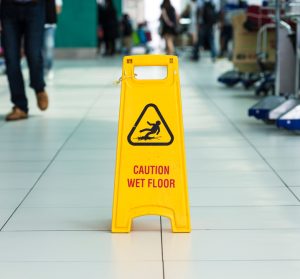 Store owners have a legal “duty of care” to maintain their properties in a safe condition for shoppers. Money, vigilance, and planning on the part of California shop keepers is required to prevent accidents and injuries from occurring on their properties.
Store owners have a legal “duty of care” to maintain their properties in a safe condition for shoppers. Money, vigilance, and planning on the part of California shop keepers is required to prevent accidents and injuries from occurring on their properties.
Property owners must anticipate all potential hazards, follow municipal building codes, train employees, and create routine supervisory and maintenance routines to ensure a safe environment.
What does it mean to “make a reasonable effort” to maintain a property?
Sometimes all it takes is a word of caution to free store owners of liability. Putting up a caution sign to warn customers of a wet floor is one of the easiest steps a store owner can take to reduce negligence – but, surprisingly, case after case shows that employees are mopping without putting up caution signs, leading unsuspecting customers to slip.
Hazardous situations can arise suddenly in a store environment, posing a challenge to store owners to keep their properties maintained. For instance, in 2012, a California Costco shopper slipped on a puddle of liquid soap that had accumulated over time and shattered her knee cap. Several employees had passed and noticed the spill, but failed to clean it up. Costco was ordered to pay over $400,000 for the woman’s medical bills, pain, and suffering.
The courts expect store owners to have routine safety procedures in place and “make a reasonable effort” to maintain order. In another famous California slip-and-fall case, a woman sued Costco when she slipped on a pot sticker food sample and shattered her tail bone. A store policy was in place that had employees inspecting the floor on an hourly basis, and the incident occurred within that window of time. The jury sided with Costco that hourly inspections should be sufficient enough to prevent most injuries.
Dangerous conditions in stores that lead to injuries
Other examples of overlooked safety issues include:
- Improper stacking of heavy objects above the reach of the typical customer
- Overloading store aisles or poor placement of merchandise
- Failing to monitor the store for new hazards
- Failure to promptly respond to known spills and water leaks
- Problems with lighting
- Loose handrails
- Broken stairs
- Failure to regularly inspect and maintain escalators
- Noncompliance with local municipal building codes or fire regulations
- Parking lot imperfections
Proving a premises liability claim
Essentially, by California State Negligence Law, the plaintiff’s case must establish:
- A dangerous condition existed at the store.
- An injury occurred that was directly related to the dangerous condition.
- The injured victim suffered damage and loss as the result of the accident.
- The store owner knew (or should have known) about the danger.
- The store owner failed to take steps to remedy the dangerous condition.
Store owners can raise the following defenses:
- “There was no hazard on the premises.”
- “The plaintiff could have easily avoided the situation.”
- “The plaintiff’s injuries were not caused by the hazard.”
- “The accident occurred where customers are not allowed.”
- “Proper signage warned of the danger.”
- “Reasonable steps were taken to make the property safer.”
Experienced store injury attorneys in Los Angeles, California
The Salamati Firm successfully represents individuals who have been injured while shopping in Los Angeles, California. Property owners often deny liability, placing the burden of proof on the plaintiff. Our experienced team is adept at compiling all the expert witnesses and supporting documents required to build a strong case, whether in settlement negotiations or in court. Over the past decade, we have secured millions of dollars on behalf of our store slip-and-fall clients.
Consider some of the following recent premises liability verdicts secured on behalf of our clients:
- A Sears customer received $375,000 in settlement after fracturing a knee that required surgery from a fall on a wet bathroom floor. No caution signs were placed at the scene.
- A shopping center customer received $337,500 in settlement for injuries sustained to both knees, resulting in medical bills of $10,000 and the future possibility of knee replacement surgery. Our client fell over a one-inch piece of metal protruding from the lot, where someone had attempted to remove a disabled parking sign.
- A 30-year-old UCLA medical assistant shopping at Sam’s Club received $575,000 after her slip-and-fall on a wet floor resulted in a torn meniscus requiring knee surgery. Her doctor diagnosed her with arthritis and predicted the need for future knee replacement.
Get in touch with a friendly and compassionate Los Angeles premises liability lawyer at 888-259-4060 for a free no-obligation consultation.
Additional “store owner liability in California” resources:
- Pasadena Star News, Covina woman awarded $415,000 following slip and fall at Industry Costco, http://www.pasadenastarnews.com/article/zz/20120307/NEWS/120308260
- Press Democrat, Santa Rosa Costco cleared in ‘pot sticker’ case, http://www.pressdemocrat.com/csp/mediapool/sites/PressDemocrat/News/story.csp?cid=2297573&sid=555&fid=181